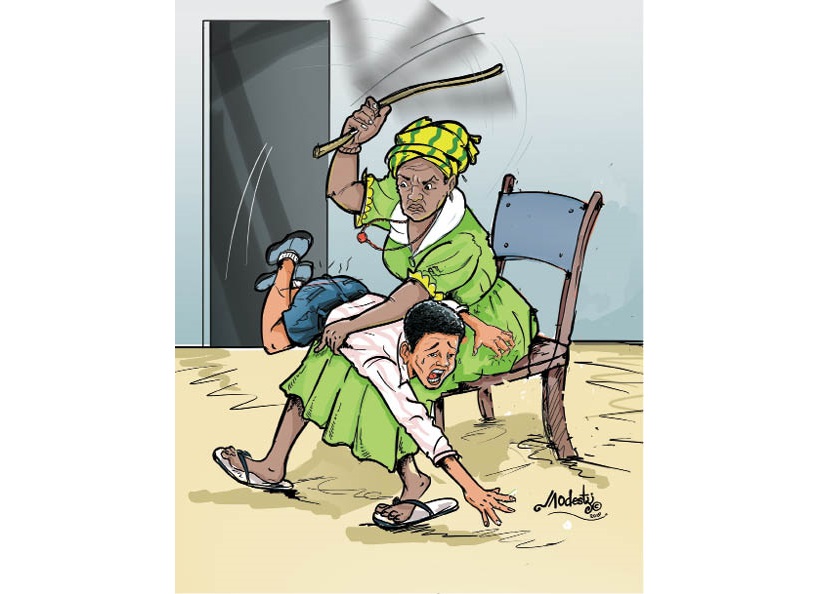Thirteen-year-old Ngozi was brought to Abuja from one of the South Eastern states by Ifeoma Obinwa, 37, who made a promise to her parents that she would enroll her in school in the capital city, but that promise was made not to be fulfilled ab initio.
So instead, immediately they arrived Abuja, Ngozi became the family’s professional housemaid contrary to the promise made to her parents. She was left to do all chores in the house and to stay in her ‘aunt’s’ shop till school closing hours when she would then pick the children and go home with them; and again, start another round of housework.
That was the daily routine of the 13-year-old girl.
Ngozi was given assignments bigger than her age, some of which deprived her from having enough sleep as they are carried out either very early in the morning or late into the night. She is woken up at about 5.00am daily to start her routine, fetching water with big plastic basin which she carries on her head. She filled every container in the house from a nearby borehole.
“The beating she gets every day for supposed delay in completing one task or the other is not what anyone would wish for her enemy,” a neighbour said. On one of the days when the maltreatment meted on the child was too much for them to bear, one of the neighbours, who had been worried by the unfortunate abuses, got in touch with the National Agency for the Prohibition of Trafficking in Persons (NAPTIP) though their hotline. She reported the various degrees of injury inflicted on the girl at her ‘auntie’s’ home.
Mrs Obinwa was arrested by NAPTIP after the Good Samaritan and was one of those paraded sometime last year to newsmen in Abuja. She claimed not to know that it was against the law to employ or take an underage child as housemaid.
Ngozi who has lived with her ‘aunt’ since 2015, was not enrolled in school and was always being physically and emotionally abused.
Apparently, Obinwa forget that that child in her custody has as much rights as she does, or her own children do. Her children, eight, six and two years old were in school but Ngozi was left behind at home or in the shop for chores and as sales girl.
The Director of Investigation and Monitoring, NAPTIP, Josiah Emerole, said the trafficking in persons act prohibits the use of any child below 12 years as housemaid anywhere in Nigeria or taking a child of the same age from Nigeria to a foreign land as same.
“Section 23, subsections 1(a) and (b), is very instructive here. This section makes it an offence for any person to employ, require, recruit, transport, harbour, receive or hire out a child under the age of 12 as a domestic worker; or employ, require, recruit, transport, harbour, receive or hire out a child (Under 18) to do any work that is exploitative, injurious or hazardous to the physical, social and psychological development of the child.
“The punishment for these offences is a minimum term of six months, but not exceeding six years imprisonment, without an option of fine,” the director explained.
A United Nations Children Fund (UNICEF) Child Protection Specialist, Mrs Sharon Oladiji, said a lot needs to be done to protect child’s rights in Nigeria, adding that despite 30 years since the adoption of the Convention of the Rights of the Child by the United Nations in 1989, children’s rights are still not protected across the globe.
“In Nigeria, experts believe that despite its ratification by the government in 2003, there is need to raise awareness for the domestication of the Child Rights Act in all states,” he added.
UNICEF Chief of Communication Eliana Drakopoulos, also said it is disheartening that thousands of Nigerian children’s rights are being violated on a daily basis.
“Every child in Nigeria and across the globe has some basic rights, but it is sad that these rights are not protected by government,” she noted.
Drakopoulos added that “contained in the treaty is a profound idea: that children are not just objects who belong to their parents, rather, they are human beings and individuals with their own rights.
“The convention says childhood is separate from adulthood, and lasts until 18 years of age.”

 Join Daily Trust WhatsApp Community For Quick Access To News and Happenings Around You.
Join Daily Trust WhatsApp Community For Quick Access To News and Happenings Around You.


